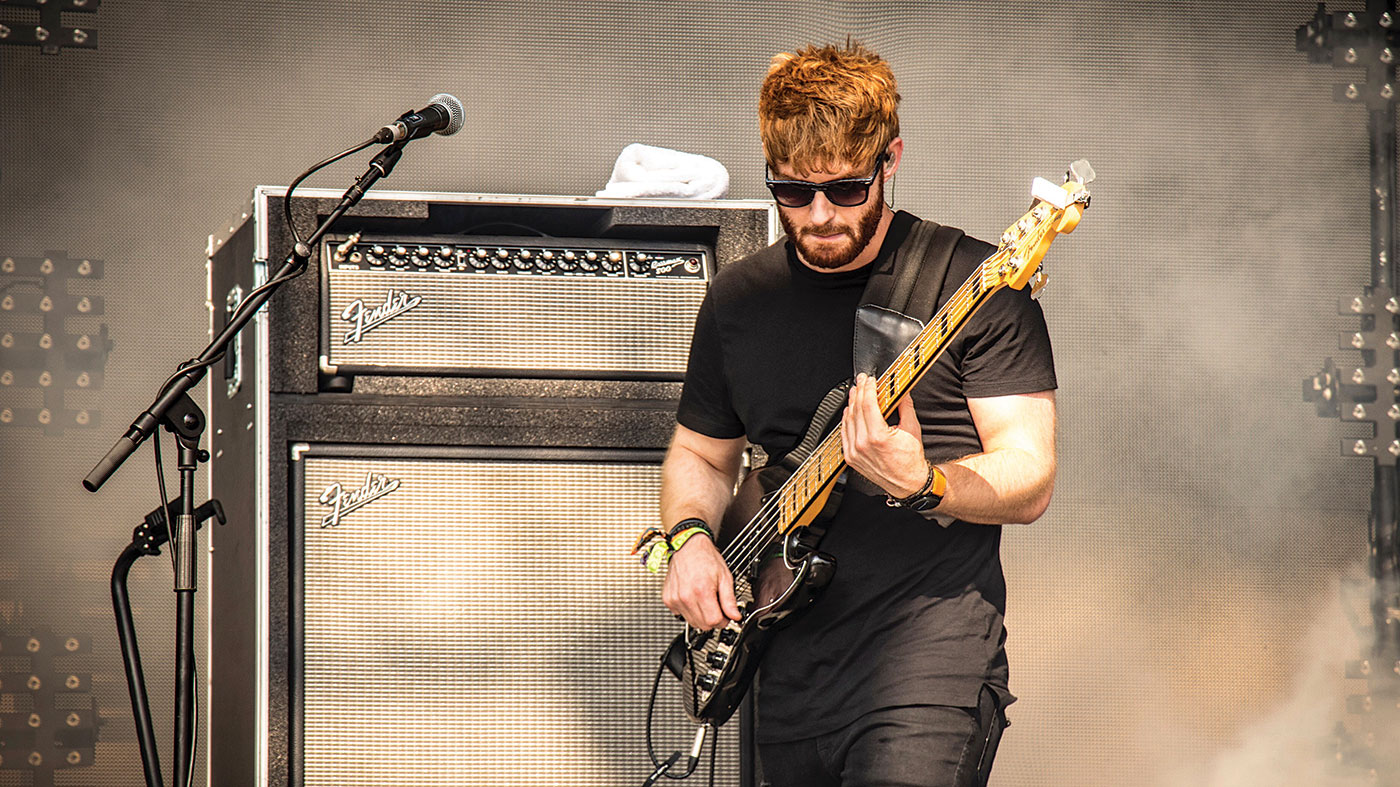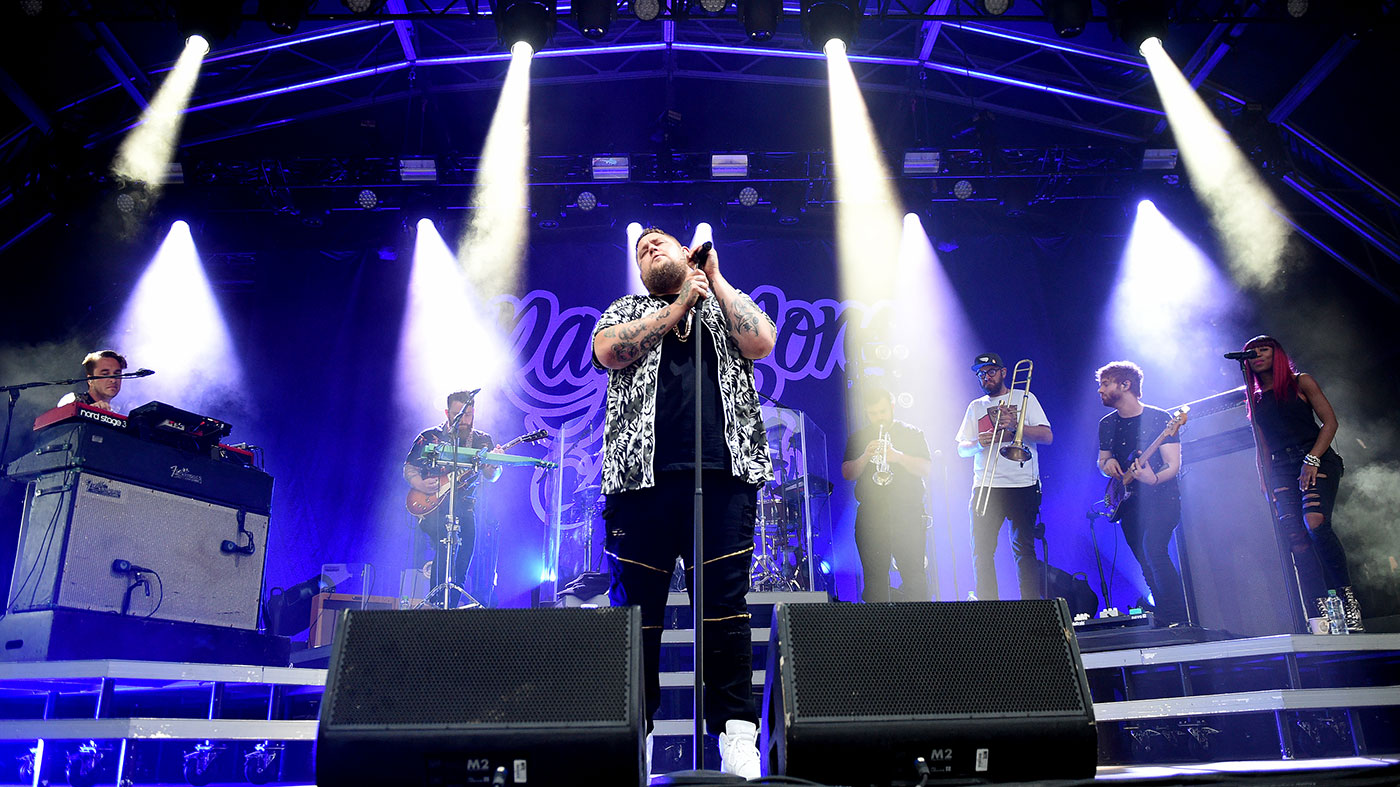Session bassist Bill Banwell: “It doesn’t matter what gig you’re doing, just play as well as you can because you don’t know who might be watching”
The Kelis and Rag’n’Bone Man bassist reflects

Want to hit the big time? Follow the example of Rag’n’Bone Man bassist Bill Banwell, whose work rate puts the rest of us to shame…
You have to admire the work ethic of in-demand session player Bill Banwell. As a teenager, he practised for five hours a day. Little wonder he was teaching bass by 16. Thereafter, he played every gig that came his way - with 100 percent conviction - and was always out networking.
The effort certainly paid off. A random function gig in London netted him a job in the band of R&B superstar Kelis, which led to him becoming the bassist for indie rockers the Hoosiers - simultaneously, we should add - and the bassaholic was still finding time for studio sessions in London. With so much work on, Banwell very nearly turned down a job in Rag’n’Bone Man’s band in 2015.
A relatively unknown act at the time, Rag’n’Bone Man went on to become one of the sensations of 2017, winning British Breakthrough Act and Choice Award at the 2017 Brit Awards. At this year’s Brits, Rag’n’Bone Man was nominated for British Album of the Year and British Male Solo Artist, taking home British Single of the Year for Human. When you arrive at one of life’s crossroads, eh? Fortunately, Banwell took the job and has been an integral part of the ongoing live success.
Despite being established on the international scene, Banwell is as down to earth as he is talented. Still living on a farm in Somerset, he is living proof that with hard work, and with a little bit of luck, it’s possible to make a living in this game. We caught up with Banwell to learn more about the secret to success.
Full-time hobby
Is playing bass what you do full time, Bill?
“Yeah, this is what I do for a living. It’s quite rare in this industry. I suppose I’ve been quite lucky to get in the right bands and then have my name pushed to other artists.
Get the MusicRadar Newsletter
Want all the hottest music and gear news, reviews, deals, features and more, direct to your inbox? Sign up here.
How long have you been doing this?
“Professionally, for seven years. I’ve been playing bass since I was 13 and started teaching when I was 16. When the touring came in I had to knock the teaching on the head, so I’m just doing gigs and recording sessions now.”
What got you into bass?
College was good for meeting musicians; I got into, like, eight bands because there weren’t many bassists around
“My friend played the guitar and I was inspired by his playing. I picked up the guitar for a few weeks but I wasn’t really enjoying it. His brother had a bass, though, and the moment I picked it up I instantly preferred it; the feel of it, the strings, the neck, and more importantly, the sound of it. So I moved straight over to that. My first bass was a cheap Precision copy by a brand called Westfield. It was a basic set-up with a 25-watt amp.”
How long did it take to get a decent bass?
“I was practising quite heavily and my parents could see I was obsessed with the bass. I really wanted a Warwick because I was into Slipknot at the time. After two or three years, my parents bought me a Warwick Thumb for my birthday. I was already gigging quite heavily. We were doing rock and metal stuff, playing in Bristol, Yeovil, Taunton, Exeter, all around the south-west. This was when I was 13 or 14, so around the year 2000. We were going strong for a couple of years, we released a few EPs, but then people got work, you know what it’s like. The band was called One Middle Finger. Terrible name [laughs]!”
Is it true that you were teaching bass at 16?
“Yes. I was practising five hours a day for two years, got my Grade Eight and started teaching. I did a year at college first, doing a Music BTEC National Diploma at Weston-Super-Mare, but quit because I was learning more outside of college than in. College was good for meeting musicians, though; I got into, like, eight bands because there weren’t many bassists around. It was a really great music scene for a small town.”

Going pro
Talk us through your professional career.
“My first proper gig was with Kelis, which I got after playing a function gig in London. A week after the gig I got a call from the keys player, who was Kelis’s musical director, unbeknown to me. He just said, ‘Hey man, I really dug your playing last week, can you do a show with Kelis in Hungary and another in Belgium?’”
That’s quite a break.
It doesn’t matter what gig you’re doing, just play as well as you can because you don’t know who might be watching
“Yeah - I guess the message is that it doesn’t matter what gig you’re doing, just play as well as you can because you don’t know who might be watching. You might have just stumbled into a good situation, so always play your best and be an easy person to get on with.”
Were you still playing the Warwick Thumb?
“Yes, I’d been playing it for 10 years. Nick Wells [former BGM editor and Warwick A&R], asked me if I wanted to be endorsed. I agreed, and he took me to Germany to meet the Warwick team, and it was nuts from then on. I was with Warwick for two or three years. I was in love with Warwicks for so long. Then I started playing Fenders, because I preferred the feel of them and the way the tone sits in this mix when you’re playing soul, pop, and R&B stuff. They gave me an 8x10” cab with a Bassman 800 for our touring schedule. I love the sound of it.”
So what happened after the Kelis gig?
“I was with Kelis for a year, touring, doing festivals and stuff. Then my friend Aaron Sayers got in touch. He was tour-managing the Hoosiers, who were looking for a new bass player, so he asked if I wanted to do a few gigs for them. I agreed because I remembered their tunes growing up, and I thought it would be a totally different gig for me, going from pop and R&B to indie punk rock. I was with them for two years, juggling Kelis with the Hoosiers and doing recording sessions for various pop acts in London.”
What came next?
“After that, it was Rag’n’Bone Man, who Aaron was also working for. He told me they were looking for a new bass and keys player and asked if I wanted the gig. I’d never heard of Rag’n’Bone Man because this was 2015, but I said I’d have a listen, and that if I could fit it in between the other two bands I’d be happy to. I didn’t really think much of it at the time, and considered not taking it on, but Aaron said, ‘Look, man, this has got potential, he’s getting bigger gigs and more of a following.’ It was a fair point, because you want to get on board with an artist on the rise.”
Jazz precision
Are you on Jazz or Precision basses for this gig?
“It’s a bit of both. At the moment I’m using the Fender Jazz Elite but I was using a Precision for a year and before that I was using the five-string Jazz Elite. On tour, I take out a Gibson Ripper, a Fender Precision and an active Jazz Elite, all four-strings.”
Do you use them all in the live set?
When it comes to TV stuff, the passive Precision sits really well in the mix
“No, I mainly use just one bass per gig, but I mix it up now and then; I’m always open to what the front-of-house guy is feeling. At the moment I’m really enjoying the Fender Jazz Elite on gigs. When it comes to TV stuff, the passive Precision sits really well in the mix. Apart from one show in America with James Corden, I used the Jazz Elite five-string because it cut through so well. For effects, I’m using an Electro-Harmonix Micro POG for one solo. I’ve got an Origin Effects Cali76 compressor, a Boss OC-2, a Darkglass B7K and that’s pretty much it.”
So you worked your balls off for years and then landed on your feet with a big-selling artist?
“Yeah, basically, haha! It’s being in the right place at the right time and meeting the right people, and having your reputation spread. A lot of people say its imperative to move to London to get a big gig, but I live on a farm in Somerset and managed to land three high profile gigs. Sometimes your reputation can carry you if you work on it enough!”


“I’m beyond excited to introduce the next evolution of the MT15”: PRS announces refresh of tube amp lineup with the all-new Archon Classic and a high-gain power-up for the Mark Tremonti lunchbox head
“These guitars travel around the world and they need to be road ready”: Jackson gives Misha Mansoor’s Juggernaut a new lick of paint, an ebony fingerboard and upgrades to stainless steel frets in signature model refresh









